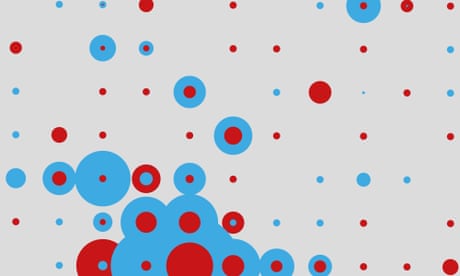theguardian.com – New coronavirus infections in Iran have risen sharply since the country relaxed its restrictions on movement, while France has said it will reimpose strict lockdowns if cases surge when it begins to emerge from confinement next week.
Tehran on Wednesday reported 1,680 new infections, nearly double the figure four days ago and the highest daily figure since 11 April when it allowed a phased return to work amid fears of economic collapse. A ban on travel between cities and business at shopping malls has since also been lifted.
“We are witnessing a rising trend in the past three or four days,” said a health ministry spokesman, Kianoush Jahanpour, blaming “our behaviour, especially in the past two weeks. A part of society has apparently had a change of attitude.”

Coronavirus: the week explained – sign up for our email newsletter
Read more
Iran has reported more than 100,000 Covid-19 cases and nearly 6,500 deaths.
France said on Wednesday it was drawing up a contingency plan to reimpose restrictions if there is a spike in cases after next Monday, when it begins lifting one of Europe’s strictest lockdowns, imposed on 17 March.
“If the virus begins to circulate again intensively, we need to give ourselves the means locally to act immediately,” Jean Castex, the “Monsieur Déconfinement” charged with organising France’s lockdown exit, told senators on Wednesday.
People’s adherence to physical distancing and washing hands was “key to the success of the fight against the pandemic”, he said. “I feel I’ve seen people letting go a little, which is not good. We risk a relapse.”
In Germany, Angela Merkel announced steps agreed with 16 federal state leaders to push ahead with lifting restrictions, with all students to return to school this month, all remaining shops to reopen, and top-flight football to resume.
But wary of a second wave of cases, Merkel confirmed plans for an “emergency brake” that would oblige municipalities to return to lockdown if there are more than 50 new infections per 100,000 inhabitants within a seven-week period.
Spain’s prime minister, Pedro Sánchez, said abruptly ending nearly eight weeks of lockdown would be “absolutely wrong, a total, unforgivable error,” as he secured parliamentary approval to re-extend the country’s state of emergency to 24 May, following days of bitter rowing and frantic negotiations.
The Danish government health agency SSI said it was “highly likely” that the epidemic would “die out on its own” in the short term, even as normal life starts to resume, but warned that the level of immunity in the population was low and there was “a considerable risk that a second wave of the epidemic will come later”.
Slovakia, which locked down harder and earlier than many of its neighbours, reopened restaurant terraces, hotels, shops outside large malls and other businesses on Wednesday thanks to better than expected progress. Small shops reopened on 22 April.
The government also gave the green light for religious services and weddings to take place with limited numbers of guests, after tests showed 11 consecutive days of single-digit growth in new infections.
Belgium’s prime minister, Sophie Wilmès, said households could welcome up to four people into their home for repeat visits from this weekend, as long as they are the same four. Guests must keep to the approved 1.5-metre distance and meetings should if possible take place outdoors, she said.
Russia reported more than 10,000 new cases for a fourth day in a row, bringing its tally to 165,929. Moscow’s mayor, Sergei Sobyanin, said restrictions would remain in place beyond the current 11 May deadline but companies involved in industry and construction would go back to work.
The European commission has said Europe will experience a recession this year of a depth unmatched since the Great Depression. The bloc’s economy is forecast to contract by 7.5% in 2020 and grow by around 6% in 2021.
Beyond Europe, China and the US escalated a war of words over when, where and how the pandemic originated. Beijing’s UN ambassador in Geneva, Chen Xu, said China would not invite international experts to investigate the source of Covid-19 until after securing the “final victory” against the virus.
Asked when the World Health Organization could expect an invitation to China, Chen replied: “The top priority for the time being is to focus on the fight against the pandemic. It’s not that we are allergic to any kind of investigations.”
The US secretary of state, Mike Pompeo, has claimed there is “enormous evidence” that the virus originated in a lab in Wuhan. But Hua Chunying, a Chinese foreign ministry spokeswoman, said the matter was one for “scientists and medical professionals, not politicians who lie for their own domestic political ends”.
Donald Trump tweeted on Wednesday that the White House coronavirus taskforce would “continue on indefinitely”, despite his vice-president Mike Pence’s comments on Tuesday that it would start to wind down in the coming weeks. Trump said the taskforce was “doing a fantastic job”and would focus on vaccines and treatments.
In other developments:
- Latvia, Lithuania and Estonia will open their borders to each others’ citizens from 15 May, creating a Baltic “travel bubble” within the EU.
- Hundreds of Indian police have tested positive for the coronavirus in recent days, raising alarm among an over-stretched force as it attempts to enforce the world’s largest lockdown.
- At least 90,000 healthcare workers worldwide – and possibly twice that – are believed to have been infected with Covid-19, and more than 260 nurses have died, the International Council of Nurses (ICN) said.
- Professor Salim Abdool Karim, the South African government’s chief adviser, said the country’s strict lockdown and proactive screening and testing programme had helped limit its death toll to 148.
 Shabtabnews In this dark night, I have lost my way – Arise from a corner, oh you the star of guidance.
Shabtabnews In this dark night, I have lost my way – Arise from a corner, oh you the star of guidance.


